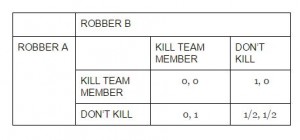The Dark Knight and Game Theory
Christopher Nolan’s The Dark Knight contains numerous examples of game theory, but I’ll be focusing on the opening robbery scene. Issues of trust, incentive, and fair share are brought up immediately. Within the first few lines the audience can sense the tension within the characters. There are six robbers and each want more of the share. They all think they are smart, but their biggest problem in their decisions is that they relied too much on trust and not the theories of game. Once a member finished his job, other robbers had incentive to kill off that member to increase his share of the stash. However, they didn’t think farther ahead in the game and suspect that another team member might kill them too.
Payoff Matrix of Killing or Not Killing Your Team Member:
Each player has the choice of killing or not killing their team member after their job is done. 0 is the equivalent of not getting any share or being killed. 1 represents that you get all of the share and 1/2 means that you get half of the share.
Based off of the payoff matrix there is no equilibrium and neither robber has a dominant strategy, but the smartest move would be for both robbers to not kill the other team member and both robbers get equal share. However none of the robbers chose this strategy. In each case their was at least one person who decided to back-stab their partner and kill them. And the Joker took this to his advantage. He took his knowledge of game theory and reminded all of the robbers the other strategies that they could play. Originally all of the robbers probably would have gone with the smartest move and all just split the stash equally and not kill each other. However this reminder from the Joker allowed the Joker to easily get rid of all the other robbers and keep all the stash to himself.
We can see that game theory doesn’t always play by how we predict it to play. These payoff matrices are just predictions of how people should behave, but they do not determine the final outcome. People make decisions on incentives/desire, moral repercussions, judgement of the other player, etc.
https://www.quora.com/In-the-opening-scene-of-The-Dark-Knight-how-was-it-smart-business-for-the-Joker-to-kill-off-all-his-henchmen-after-the-bank-heist

